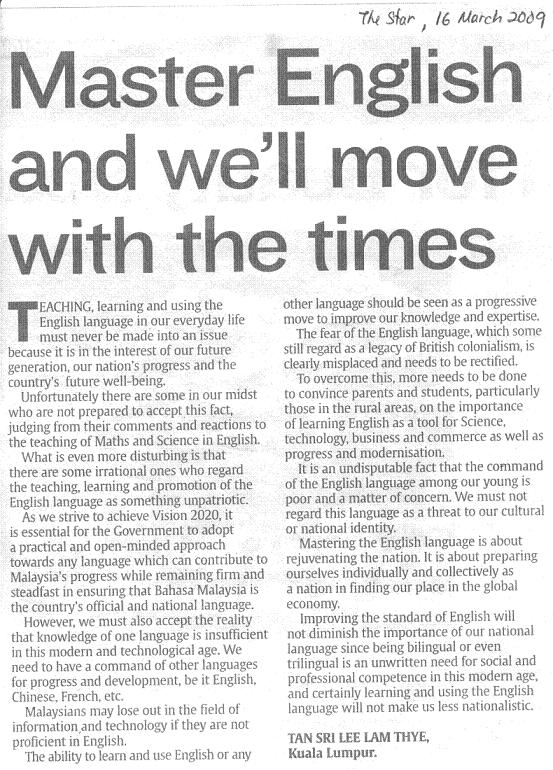Local News


“Mix with others, students told”
(The
Star, Monday 17 July 2006)
“They
should not only research on the types of courses and universities available
but brush up their English and equip themselves with some knowledge of the
culture and lifestyles there,” Deputy Higher Education Minister Datuk Ong
Tee Keat.
“It is
important to be able to work as a team and to have good communication skills
besides scoring good grades. No employer wants to hire someone who has poor
communication skills and with no confidence,” Harvard Club of Malaysia
president Tan Sri Dr Lin See-Yan.
“Grads
need more than hard skills”
(The
Star, Sunday 21 May 2006)
IN
a multi-racial society like Malaysia, there are always opportunities for
people to acquire more than one language. For businesses to thrive in some
countries, being able to speak in a foreign language is always an advantage.
Even
developed countries doing business with other countries find it an asset to
have employees who are proficient in foreign languages.
Foreigners
doing business with China, for instance, would find it to their advantage if
they can speak Mandarin in their negotiations with local partners.
Being able to communicate in English would be an asset if
developing countries are doing business with developed countries where
English is widely used.
There are
numerous Malaysian-based companies doing business in Indonesia and the Arab
countries and most negotiations are made in the local language.
In our setting, thousands of graduates seek jobs in the
public and private sectors annually. Many were not successful partly due to
language inadequacy, especially in the private sector.
Besides the hard skills graduates have acquired while
studying at the university, prospective employers dealing with international
businesses would, as expected, seek candidates who are proficient in the
English language.
To these companies, the English language is just
indispensable.
In a recent survey done by a local university on 74
companies in the country – both national and international – prospective
employers invariably look for at least 12 most important areas of skills
when English is most needed at the workplace.
To these
companies, their employees should be able to talk resourcefully to convince
clients, negotiate effectively to win business opportunities, communicate
impartially to resolve differences in opinions, speak convincingly over the
phone, converse with proper etiquette or manners and adjust to formal and
informal situations when communicating.
They should
also be able to draft and write proper letters to clients, write short
reports on business dealings and events, understand and report what others
have discussed, understand and clarify information, letters and reports
received, present facts in a clear and plain manner to an audience and
conduct meetings in a brief and effectual manner.
Looking into
these criteria, are our present graduates competitive enough to join the
workforce in the private sector?
Graduates
who can express well during interviews are more inclined to impress their
prospective employers. Proficiency in a foreign language helps our graduates
a lot more.
Graduates should not be complacent with only the hard
skills they have. They should also make effort to be good in the English
language.
Local Events
Talks
On 23rd
& 24th July 2005, Pro-TEST Consultancy had organised a talk on
“How to Manage Your English Proficiency” at MPH 1 Utama and MPH Mid Valley
Kuala Lumpur.
Seminars
During
the seminar at Genting - "Interaksi Minda : Membesar Dan Membimbing Remaja
Masakini". Pro-TEST Consultancy Sdn. Bhd Executive Director, Ms. Song Hooi
Ling with Associate Consultant, Datuk Dr. Ismail Noor.
Genting
Talk - Karnival Keluarga Bahagia Penyayang 15th till 17th April 2005 Seminar
- "Interaksi Minda : Membesar Dan Membimbing Remaja Masakini". Ms Song
giving the plenary paper.